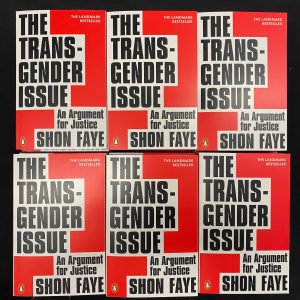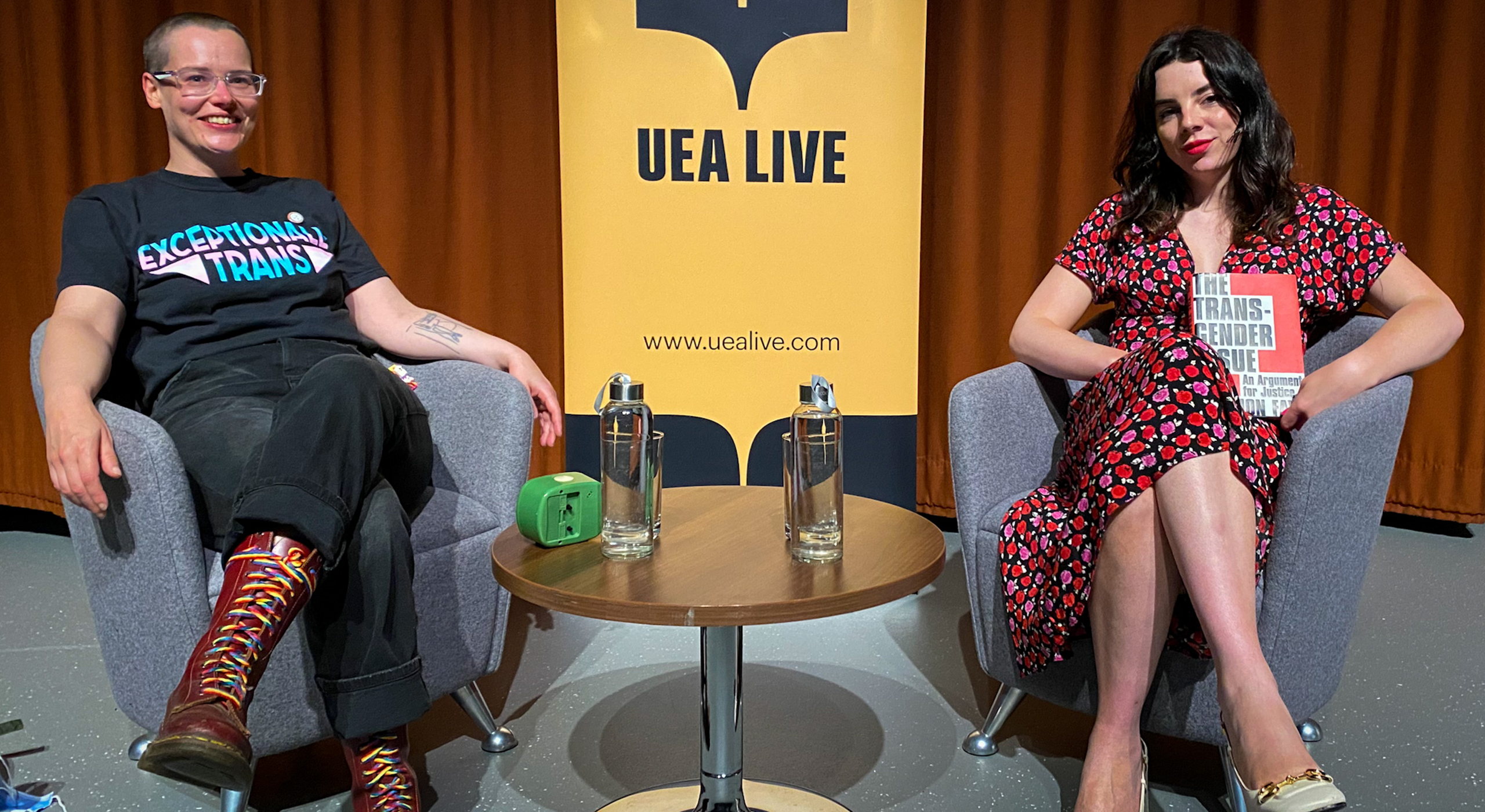Shon Faye: Tackling the Issue of Liberation
By Krysta Mckenzie for UEA Live
It’s been years since I was able to go to an author event in person and Shon Faye brought back the familiar feeling of giddiness that I always used to get. When I walk into the foyer, I am surrounded by old friends that I hadn’t spoken to in months, so of course, the atmosphere feels electric as everyone grins and chats in anticipation. Every person I speak to before I enter the lecture theatre is filled with excitement and it is no surprise because I have always noticed that when queer people and people of colour come together on the UEA campus, the air always feels lighter – there is an easy comfort.
 Shon Faye was everything she needed to be during this event; charming, funny, firm, and succinct. Every now and again she would apologise for spending so much time answering KR Moorhead’s questions, but I think this is very reflective of her writing in her book, The Transgender Issue. It is apparent that she understands that talking about the transgender issue/issues that trans people face requires time. There are no easy answers to questions regarding this because it is a complex situation – as she very strongly demonstrates in her book, the issues that trans people face are very connected to the structural imbalances in society. Faye made it very explicit that the liberation of trans people would also lead to the liberation of all marginalised people because it would include creating a society with easy access to healthcare and housing, as well as ending capitalism and the prison industrial complex. All of which would benefit the underprivileged people in society.
Shon Faye was everything she needed to be during this event; charming, funny, firm, and succinct. Every now and again she would apologise for spending so much time answering KR Moorhead’s questions, but I think this is very reflective of her writing in her book, The Transgender Issue. It is apparent that she understands that talking about the transgender issue/issues that trans people face requires time. There are no easy answers to questions regarding this because it is a complex situation – as she very strongly demonstrates in her book, the issues that trans people face are very connected to the structural imbalances in society. Faye made it very explicit that the liberation of trans people would also lead to the liberation of all marginalised people because it would include creating a society with easy access to healthcare and housing, as well as ending capitalism and the prison industrial complex. All of which would benefit the underprivileged people in society.
Faye decided that she wanted to write The Transgender Issue around the time that she became a freelance writer a few years ago when trans visibility was on the rise as she felt “a moral obligation”. She explained to the audience that the idea stemmed from a conversation with her manager where she was essentially ranting about the hostility in the conversation around trans people at the time, as people who are not trans would constantly talk about ‘the transgender issue’ without ever addressing “the complexity of trans lives”.[1] There has been a representation of trans people as a joke throughout film and media history, so Faye explains that when more people started being open about their identity the media realised that they could no longer present this community as a joke. This led to a “moral panic” painting trans people as aggressors to be feared and causing trans people to have to fight to keep what little rights they do have. The Transgender Issue, then, is a text that is intended to create clarity about the depth of the issues that trans people do have, and Faye uses facts alongside the lived experiences of several trans people to do this.
Whilst I was sat in the lecture theatre listening to this brilliant speaker and author talk candidly about what the world could be if marginalised groups formed a coalition, I was reminded of something James Baldwin wrote in a letter to Angela Davis; “…if they take you in the morning, they will be coming for us that night”.[2] It has never been more evident that there needs to be more unity amongst marginalised people. Recently, the Supreme Court has been stripping back protections for women, and people with uteruses, to get abortions. This has been deeply disturbing because it falls in line with all the legislation that has been becoming enforced against trans people. The running theme at the moment is banning people from having autonomy over their own bodies. James Baldwin and Shon Faye can both agree on the fact that when the government take away protections for people in broad daylight and we do nothing to stop it, unless you are an able-bodied upper class cis white man, you will be next. The urgency in Faye’s tone (both in her book and at the event) enriched my own desire for revolution because the world is constantly making it clear that unless we deal with all our issues at once, it will never be enough.
Despite Faye’s explanation of why this book felt essential for her to write and the dismal topics that she spoke about, I never felt a sense of hopelessness in her responses to KR Moorhead’s thought-provoking questions. Instead, there was a need that settled in my heart to do more for my community and other disenfranchised people. Before Shon Faye wrote The Transgender Issue, she was writing articles about trans people every now and again before she realised that it was not going to be enough. When an audience member asked what would be enough to start making changes, a sad look crossed her face because there is no easy solution. However, she suggested that the most helpful thing that we as individuals can do include participating in mutual aid funds and directly helping the community financially. While this seems small in the grand scheme of police and prison abolition, regaining full autonomy of our bodies, and securing universal housing and healthcare, it is a tangible way that each of us may start to open up the paths to freedom that governments and people in power have been working so hard to destroy.
Krysta McKenzie
(he/they)
Author Bio
Krysta McKenzie is a Jamaican non-binary lesbian studying English Literature at UEA, who is interested in postcolonial studies, queer literature, womanism, poetry and has great desire to witness the abolition of the prison industrial complex. He is also a big fan of Steven Universe and loves seeing representation in fantasy shows.
[1] Shon Faye, The Transgender Issue (UK: Penguin Books, 2021), xii.
[2] google

